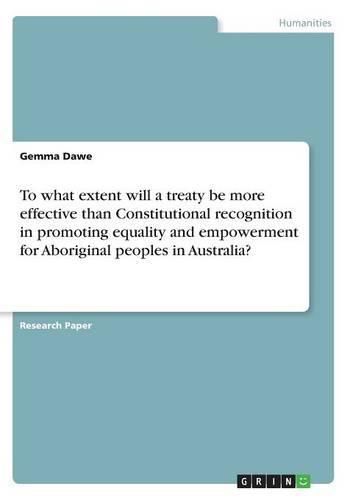Readings Newsletter
Become a Readings Member to make your shopping experience even easier.
Sign in or sign up for free!
You’re not far away from qualifying for FREE standard shipping within Australia
You’ve qualified for FREE standard shipping within Australia
The cart is loading…






Research Paper (postgraduate) from the year 2016 in the subject Sociology - Individual, Groups, Society, grade: A+, course: Research Project B, language: English, abstract: In Australia, Aboriginal peoples face serious inequalities in health, education, and employment due to disempowerment, but a treaty would provide Aboriginal peoples with power for change. A treaty is ‘a formal agreement that sets down terms and conditions by which two or more parties can co-exist.’ . In the Australian Constitution, Aboriginal peoples remain unrecognised as primary custodians of Australia. Current debate between Government and Indigenous communities about how to effectively promote equality and empowerment encompasses two main arguments: to have either a legislated treaty or Constitutional amendments. The majority agree that whilst Constitutional amendments are part of the solution, they will not increase equality and empowerment to the same extent as a treaty would: Give people substantive power in their own affairs, encourage and support them in taking responsibility for themselves, offer assistance as they design tools for the exercise of that power - and chances are good they will do remarkable things. If the Australian government provided Aboriginal nations with substantive power through a treaty, leading to self-determination, these ‘remarkable things’ would be improved healthcare, housing, education, employment, human rights, and higher overall wellbeing. Further, a treaty would empower First Nations peoples of Australia and begin a process of healing.
$9.00 standard shipping within Australia
FREE standard shipping within Australia for orders over $100.00
Express & International shipping calculated at checkout
Research Paper (postgraduate) from the year 2016 in the subject Sociology - Individual, Groups, Society, grade: A+, course: Research Project B, language: English, abstract: In Australia, Aboriginal peoples face serious inequalities in health, education, and employment due to disempowerment, but a treaty would provide Aboriginal peoples with power for change. A treaty is ‘a formal agreement that sets down terms and conditions by which two or more parties can co-exist.’ . In the Australian Constitution, Aboriginal peoples remain unrecognised as primary custodians of Australia. Current debate between Government and Indigenous communities about how to effectively promote equality and empowerment encompasses two main arguments: to have either a legislated treaty or Constitutional amendments. The majority agree that whilst Constitutional amendments are part of the solution, they will not increase equality and empowerment to the same extent as a treaty would: Give people substantive power in their own affairs, encourage and support them in taking responsibility for themselves, offer assistance as they design tools for the exercise of that power - and chances are good they will do remarkable things. If the Australian government provided Aboriginal nations with substantive power through a treaty, leading to self-determination, these ‘remarkable things’ would be improved healthcare, housing, education, employment, human rights, and higher overall wellbeing. Further, a treaty would empower First Nations peoples of Australia and begin a process of healing.